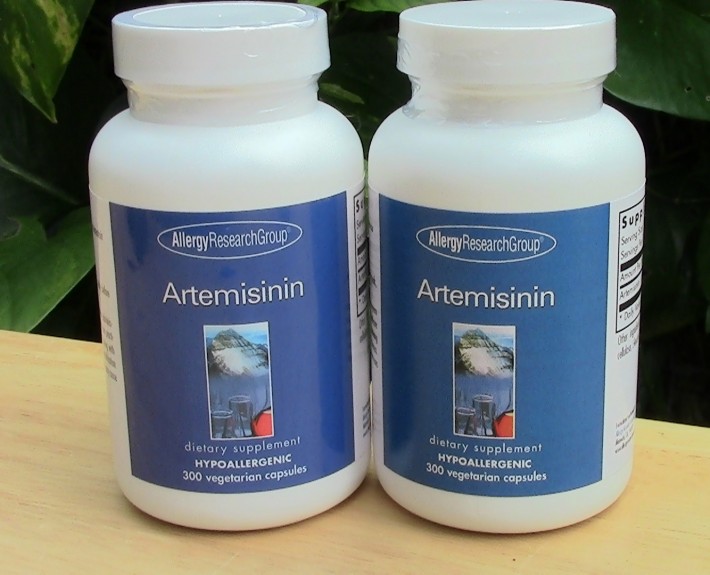Artemisinin is the active substance extracted from Artemisia annua or sweet wormwood. Artemisinin extract provides approximately 300 times more of the active ingredient than the whole herb itself. Artemisinin is known for its effect on the malaria parasite, Plasmodium, and in recent years has been extensively studied for its use in cancer treatment. Artemisinin has been shown to have anti-proliferative effect on a number of human cancer cell types.
Artemisinin works by destroying cancer cells in the same mechanism of action as it kills the malaria parasite. Both malaria parasites and cancer cells isolate and accumulate iron. Artemisinin is selectively toxic to iron-loaded cells. The iron in our red blood cells is not free but is bonded and therefore our red blood cells are not affected by Artemisinin.
Cancer cells are thirsty for blood to support their fast growing action and therefore take up and accumulate relatively larger amounts of iron than normal cells. Artemisinin has two oxygen atoms which react with the iron in the cancer cells and then form reactive free radicals that kill the cancer cells.
The use of Artemisinin, its pharmacology, dosage and toxicity have been well studied in its application against malaria. It is relatively safe with little side effects even at high dosages of 70mg/kg per day. This makes its oral use fairly effortless.
“Artemisinin may be a most effect method, and certainly one of the easiest, of delivering a knockout oxidative stress to cancer cells.” – Dr. Robert Rowen
Artemisinin continues to be studied actively. The Development Therapeutics Program of the National Cancer Institute, USA has analyzed Artesunate (ART), a semi-synthetic derivative of Artemisinin for its anti-cancer activity in 55 cell lines. ART was most active against leukemia and colon cancer cell lines, least active in non-small cell lung cancer cell lines and intermediate in melanomas, breast, ovarian, prostate, CNS and renal cancer cell lines. Scientists of this study suggest that because of the known low toxicity of ART that it may be a promising new candidate for cancer chemotherapy.
Laboratory studies show that Artemisia inhibits cancer cell proliferation, metastasis and angiogenesis: the development of new blood vessels supplying the tumor in nutrients.
Practical Application
Recommended dose: 25 – 90 mg per 100 pounds of patient weight. Artemisinin is taken on an empty stomach with natural fats, once daily before bed (cancer growth is more active during sleep). It is quickly absorbed and reaches its peak concentration in the blood within 40 minutes.
Artemisinin is not a stand-alone cancer therapy, but is integrated into our comprehensive cancer treatment strategy.
Case Report
Taken from Townsend Letter article: Artemisinin: from Malaria to Cancer Treatment written by Robert Jay Rowen M.D.:
“L.L. is a West Coast woman in her 40’s with breast cancer and extremely painful metastases all over her spine. She had received limited radiation therapy to reduce the pain in the thoracic spine prior to consulting me. She began Artemisinin, and a variety of complementary strategies, including diet, detoxification, and Kelly type proteolytic enzymes (from Allergy Research Group). Immediately, her energy exploded. Her pain level took a dive when she received treatment from an Edgar Cayce Foundation healer. Her comment after two weeks of Artemisinin was “Last week I thought I was dying, and today for the first time in months, I believe I am going to live.” Four months into therapy using oral supplements alone (no IV therapy), diet and detoxification strategies, a PET scan, the most efficient and sensitive study for spread of cancer, did not show any activity anywhere in her spine, even in places that were present before and not radiated! Further, the scan did not confirm definite cancer activity anywhere else!”
References:
Efferth, T., Dunstan, H., Sauerbrey, A., Miyachi, H., Chitambar, C.R., The anti-malaria artesunate is also active against cancer, International Journal of Oncology, 18; 767-773, 2001
Rowen, R.J. M.D., Artemisinin: From Malaria to Cancer Treatment, Townsend Letter, December 2002, 86-88.

